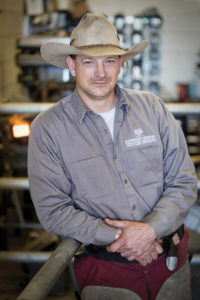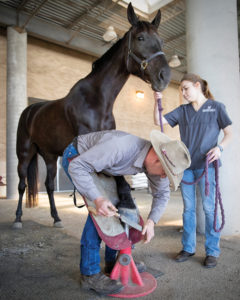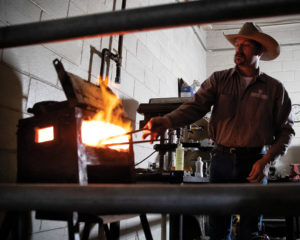Urban Cowboy
Farrier Jason Maki has been the recipient of many on-the-job horse kicks, but a recent encounter stands out as more memorable than the rest—because it may have saved his life.
Story by Jennifer Gauntt
Over the years, Jason Maki, the farrier at the Texas A&M College of Veterinary Medicine & Biomedical Sciences’ (CVM) Large Animal Hospital (LAH), has sustained dozens of injuries.
“The one that actually put me out of work the longest was when I tore my groin muscle, because I couldn’t work around it,” Maki said. “I’ve torn my hamstring, broken my finger, broken my wrist, broken my foot, and broken my ankle. I detached my tricep tendon. I’ve been kicked through a wall, twice, and had a donkey kick me in the head and knock me out cold.”

Danger, he says, is part of the job.
So, in September 2018 when Maki was kicked just under his right ribcage while shoeing a large Friesian-type horse, he reacted as he normally would—by gasping, coughing, and trying to walk it off.
“Some people saw that I looked pretty gray and noticed that I couldn’t breathe, so they took me to the occupational health doctor,” he said. “The doctor looked at me and said, ‘we’re sending you to the emergency room.’”
When the emergency room doctor ordered a CAT scan, Maki was disappointed to realize that he may have broken a couple of ribs, and when the doctor ordered more tests, Maki began to worry that he may have ruptured something.
“The doc came back in and said, ‘Well, as far as the trauma goes, you have a bad contusion, bruising, and you’re going to be sore for a while, but you have a renal cell carcinoma on your right kidney…’ and I was like, ‘excuse me?’ That’s literally what I said,” Maki said. “I’m lying there and he repeated what he had said, like that would clarify things for me.”
Still reeling, Maki began further testing. He learned that the cancer had a 97 percent survival rate and that, luckily, all that would be required was to remove his right kidney because the cancer hadn’t spread.
“Long, but scary, story short, the cancer was all in the kidney, and now, my kidney’s gone,” he said. “Literally, when I was in there after my two-week appointment, the doctor read that (prognosis) to me, and he said, ‘So, basically, that means you’re healed.’”
SADDLING UP
Farrier wasn’t the career field Maki thought he would pursue growing up the oldest of four “farm kids” in Ashtabula, a tiny, “very rural” town in Northeastern Ohio.
While his family raised Arabian horses and Brittany Spaniels, and he grew up riding and showing horses, Maki went to college to double major in political science and history with the intention of going to law school.
“By the time I had a constitutional law course, I realized I didn’t want anything to do with any of that, so I have a very liberal liberal-arts education,” he said.
Maki had learned farrier skills as a way to pay for law school, so, after trying out several career options, including the military (which was ended after an injury) and working at a manufacturing plant, he decided to attend horseshoeing school.
He operated his own farriery for more than 10 years when he found that his profits were dwindling and he “was literally working myself to death.” A friend emailed him a link for a job at Texas A&M looking for its first full-time farrier, and the rest, as they say, is history.

A STABLE ENVIRONMENT
Today, Maki is one of only a few full-time farriers at veterinary colleges across the United States (five other veterinary schools have farriers).
After 10 years at Texas A&M, Maki still lights up when he talks about his job. He loves that each day brings something different, that he has been able to cultivate his own client base, and, most importantly, that he gets to be a part of the collaborative spirit that is embraced by the CVM faculty, clinicians, students, and administrators.
“The beautiful thing about veterinary medicine, at large, and in my particular small role in taking care of horses’ feet, is that there’s always work to be done,” Maki said. “There’s always something new to learn, and there’s always a new way to look at something—multiple perspectives, multiple modes of input—so it’s multifactorial; you never run out of things to think about.”
In addition to learning, Maki also has the opportunity to teach. While there is no fourth-year rotation for farriers, Maki interacts with students through the cases that require his skills, as well as a two-hour third-year skills lab he teaches that requires students to work on foot models by applying and removing shoes.
“We want to be proud of our didactic abilities and our knowledge. We want to share our knowledge, and we want to engage, and make people answer their own questions,” he said. “But I have found the less I say in a physical lab, the more they learn, because I’m simply showing students what I want them to do, why I want them to do it, and then let them go (practice).
“Students will remember what they teach themselves, so I give them a parameter to work within and offer tips when they encounter issues they struggle with,” he said. “They teach themselves how to physically do something and then they remember.”
Working with so many people from such diverse backgrounds on a variety of cases and being exposed to new and changing technology also have allowed him to become better at his job.
“I am so lucky in the things that I’m exposed to, the knowledge that I have been able to gain, and the professionals I work with,” Maki said. “I mean, for any question I have, there are two to three world-renowned experts at arm’s length, so the educational opportunities are unending. You absolutely can’t beat it; you’re forced to work collaboratively, which makes the outcome better for everyone.
“Socially, everyone is treated respectfully, and there’s a much more open exchange of ideas, up and down the food chain,” he said. “I love that about this place; I actually really enjoy that openness.”
LOOKING FOR LESSONS

Throughout the process of learning about and being treated for his cancer, Maki devoted a lot of time to researching its cause and inwardly contemplating what he was supposed to derive from his experience.
“I had a lot of time to think, and I kept trying to figure out what the lesson was,” Maki said. “Before my diagnosis, I was essentially having the conversation with myself that if I don’t feel a horse is absolutely trustworthy, I’m not going to work on it.
“Well, if I hadn’t worked on that horse, like the other one that I had declined earlier that week because I didn’t feel that it would sedate well, I never would’ve found out (about the cancer),” he said.
That lesson was compounded by what he concluded may have led to his cancer—exposure to chemicals now known to cause kidney cancer without wearing a respirator at his manufacturing job all those years ago.
“It’s ironic—that bulldog mindset built the life that I have, but it almost took it away, as well; it would’ve killed me,” Maki said. “So, I’ve decided that has to be the lesson—I have to realize that as a person, and as an intellect, I have value beyond what I can do; that’s what I learned out of this.”
He also learned the value of family—his LAH family, who offered him unending support during his recovery; his “brotherhood” of farriers who stepped in to help manage his caseload while he was out; and the family he goes home to every night—his wife, Heather, and daughters, Kelsey and Carly. His 19-year-old son, Ryan, is a criminology major at Cleveland State.
“I wouldn’t trade those girls and Heather for the world. We have a wonderful life together, all of us. We always have fun, and we always challenge each other to see new things,” he said. “I couldn’t write a story to make my life any more perfect on that front.
“And, then, when it came right down to it and things got really scary, my family was right there—to talk to, to think about, who always…,” he paused, mid-thought. “You could see the terror in Heather’s face, but she always responded rationally and reasonably, and if I was getting too far out in left field, she would bring me back in; she was the last face I saw before I went to sleep, and the first one I saw when I woke up.
“I am the most blessed guy in the world,” Maki concluded. “I have an amazing place to work, I am blessed to be here, and I am blessed to have the people around me that I do. I wouldn’t trade any of it for anything.”
###
Note: This story originally appeared in the 2019 Spring edition of CVM Today.
For more information about the Texas A&M College of Veterinary Medicine & Biomedical Sciences, please visit our website at vetmed.tamu.edu or join us on Facebook, Instagram, and Twitter.
Contact Information: Jennifer Gauntt, Interim Director of Communications, Media & Public Relations, Texas A&M College of Veterinary Medicine & Biomedical Science; jgauntt@cvm.tamu.edu; 979-862-4216


